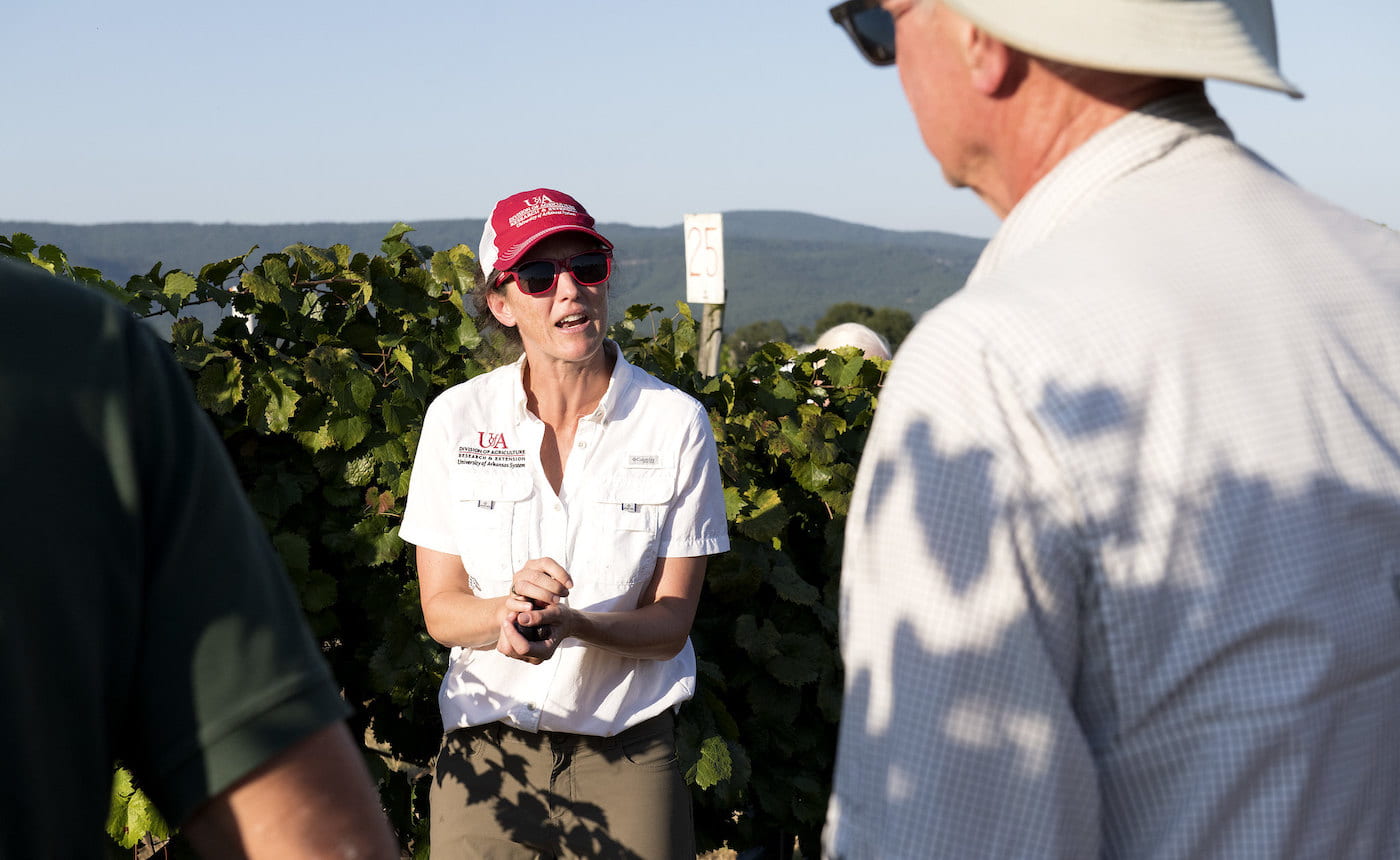CLARKSVILLE, Ark. — The Sept. 9 Muscadine Field Day at the Fruit Research Station will feature tastings, tours and a tale of growth by Rusty Tractor Vineyards.
The field day is being presented by the University of Arkansas System Division of Agriculture in conjunction with the Arkansas Association of Grape Growers. It will be hosted at the Fruit Research Station near Clarksville, part of the division’s Agricultural Experiment Station research arm.
Attendees will see/taste varieties developed by the Division of Agriculture including Altus™ and Mighty Fine™, the organization’s first muscadine cultivars, and hear industry insights from Rusty Tractor Vineyards of Little Rock.
Registration is required, and the deadline to register is Aug. 21. The Muscadine Field Day includes dinner and is $30 per person for non-members and $20 per person for AAGG members and UA System employees and students. Registration and payment are two separate tasks. Register online, then complete payment through the Arkansas Association of Grape Growers.
“This field day is an important opportunity that allows our Arkansas grape and wine industry attendees to gain first-hand knowledge about how our UA System research and extension efforts have impact in Arkansas and beyond,” said Renee Threlfall, associate professor and enologist and viticulturist, for the Division of Agriculture.
Amanda McWhirt, extension specialist-horticulture crops, said “this workshop will offer something for both new and established growers.
“Beginning growers will learn how to plant and establish muscadine vines, what to watch out for regarding pests and have the opportunity to hear from established growers on how to develop a winery business,” she said. “Established growers will appreciate getting to see and taste the latest muscadine grape variety releases from the Division of Agriculture fruit breeding program and see the newly established muscadine variety trial.”
Agenda
- 1 p.m. — Registration, muscadine fruit and juice tasting
- 1:30 p.m. — Welcome, Jackie Lee, Fruit Station director,Arkansas Association of Grape Growers Board member
- 2 p.m. — Overview of the Vitis x Muscadinia project, Threlfall
- 2:20 p.m.— Variety Selection Tool Demonstration, Lizzy Herrera, extension program associate-horticulture
- 2:30 p.m. — Grower Profile “How we got started and what we built in the last 15 years,” Rusty Tractor Vineyards
- 3 p.m. — Can You ID the Most Common Pests of Muscadine?, Aaron Cato, extension specialist-integrated pest management-horticulture
- 3:45-4:15m. Variety Trial Tour — Tips for Establishing Young Plantings, McWhirt and Joie Bogart, University of Arkansas graduate student.
- 4:15-5:45m. Tour of Advanced Grape Selections Plantings, Margaret Worthington associate professor and fruit breeder.
- 5 p.m.— Dinner
To learn more about the Division of Agriculture research, visit the Arkansas Agricultural Experiment Station website. Follow us on 𝕏 at @ArkAgResearch, subscribe to the Food, Farms and Forests podcast and sign up for our monthly newsletter, the Arkansas Agricultural Research Report. To learn more about the Division of Agriculture, visit uada.edu. Follow us on 𝕏 at @AgInArk. To learn about extension programs in Arkansas, contact your local Cooperative Extension Service agent or visit uaex.uada.edu.
About the Division of Agriculture
The University of Arkansas System Division of Agriculture’s mission is to strengthen agriculture, communities, and families by connecting trusted research to the adoption of best practices. Through the Agricultural Experiment Station and the Cooperative Extension Service, the Division of Agriculture conducts research and extension work within the nation’s historic land grant education system.
The Division of Agriculture is one of 20 entities within the University of Arkansas System. It has offices in all 75 counties in Arkansas and faculty on three campuses.
Pursuant to 7 CFR § 15.3, the University of Arkansas System Division of Agriculture offers all its Extension and Research programs and services (including employment) without regard to race, color, sex, national origin, religion, age, disability, marital or veteran status, genetic information, sexual preference, pregnancy or any other legally protected status, and is an equal opportunity institution.





